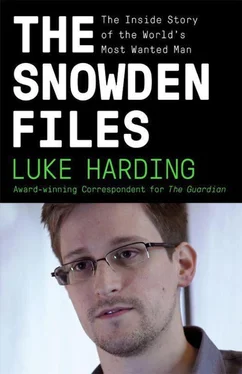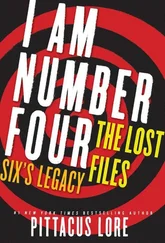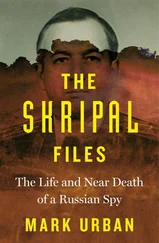Scoop ’s journalist hero William Boot pens nature columns for a living. ‘Feather-footed through the plashy fen passes the questing vole’ was one of his more famously memorable lines. When Boot is sent to cover a war in far-off Africa he takes with him an inflatable canoe. (Boot was modelled loosely on Bill Deedes, legendary editor of the Daily Telegraph , who in 1935 arrived to cover the war in Abyssinia with a quarter of a ton of baggage.)
Rusbridger’s canoeing weekend was intended to be a break from the gruelling demands of editorship. It didn’t last. Still on the riverbank, he answered his mobile phone. Police had arrested David Miranda, the 28-year-old partner of Glenn Greenwald, at Heathrow airport! They were holding him under schedule 7 of the UK’s Terrorism Act! They had confiscated his rucksack!
The terrorism law, enacted in 2000, is aimed at killers. It is designed to allow police to stop possible jihadists or IRA members planning bombings, as they enter Britain. It is a draconian piece of legislation: no ‘probable cause’ or specific suspicion is needed. The purpose of the stop is a grave one: to assess whether someone may be involved in the ‘commission, instigation or preparation of acts of terrorism’.
Miranda wasn’t a terrorist. The British authorities knew that perfectly well. He was the partner of a journalist. They suspected he was in fact carrying copies of Edward Snowden’s NSA and GCHQ files, which Greenwald was engaged in researching and publishing. Their prime purpose, as they were later to admit, was simply to get hold of the files, and find out how much Greenwald knew.
On 11 August, Miranda had set off from their home in Rio de Janeiro to Berlin, flying via Heathrow. He spent several days with Greenwald’s fellow journalist Laura Poitras in the German capital. They discussed film projects. He did some sightseeing. He spent a couple of nights in a hotel. He was now flying home, again via the UK. The British and Americans had him under surveillance – possibly even the same spooks who had bugged Angela Merkel’s phone.
The heavily encrypted Snowden files Miranda was carrying formed the basis of Greenwald and Poitras’s numerous articles for the Guardian and for other international publications, including France’s Le Monde , Germany’s Der Spiegel , the Washington Post and the New York Times . One of the files was an index, compiled by a piece of specialised software, to Greenwald’s 58,000 GCHQ documents. There was also further encrypted material. A passphrase to the index was scribbled down and carried in Miranda’s wallet.
Rusbridger knew nothing about the details of Miranda’s journey. Greenwald had booked Miranda’s flight through the paper’s New York office, as part of the steady stream of research the paper was financing. It was one of the perils of working with freelancers: the Guardian was picking up the bills, but it wasn’t always calling the shots.
In moments of crisis Rusbridger radiates calm. The New Yorker ’s Ken Auletta calls him ‘unflappable’. Profiling him, Auletta wrote that Rusbridger’s mild-mannered appearance is deceiving; underneath he is steely. One of his tasks as an editor is to apply himself in a calm manner to multi-dimensional problems.
The Snowden story was certainly one of those. On his iPad, Rusbridger carried a sprawling spider diagram linking the diverse issues around the Snowden material. They were legal and editorial. And physical – the need to keep the material safe. There were multiple actors in different jurisdictions; precarious alliances between the Fourth and Fifth Estates. Seemingly the spy agencies were now actively bugging Guardian contributors. This made communication difficult.
During his 18 years as Guardian editor, Rusbridger had run numerous big stories. He had presided over its transformation from a left-leaning British niche print title to a global digital brand. In 2009 the Guardian had uncovered rampant phone hacking in Rupert Murdoch’s newspaper empire, and brought about the closure of his tabloid News of the World followed by a dramatic series of arrests. In 2010 Rusbridger published the pioneering WikiLeaks documents. But the Snowden story was the biggest of all.
The editor’s immediate problem was how to help Miranda. Police had held him at Heathrow airport since 8.05am. Under the Terrorism Act they could detain him for nine hours. Rusbridger phoned Gill Phillips, the Guardian ’s in-house head of legal. She was in a village in Wiltshire. Too far from Heathrow. Phillips called Bindmans, prominent solicitors specialising in civil liberties. One of them, Gavin Kendall, scrambled to the airport.
In the meantime, Rusbridger and Porter spent the next four hours paddling along the Avon. They were heading downstream from Stratford to Bidford, a village where William Shakespeare is said to have crashed out under a crab-apple tree after a drinking competition. The editor kept his phone in a waterproof bag; every so often he would unzip it, to get updates.
Miranda describes his ordeal in detention as ‘intimidating, stressful and deeply frightening’. Police had demanded passports of all passengers as they came off the BA plane; when they reached Miranda, they led him in silence to a custody suite. There, they told him he was being examined under anti-terrorism legislation. ‘This made me very afraid,’ Miranda says. ‘When I heard “terrorism” I was really shocked and told them I had nothing to do with terrorism.’
The two examining officers told him that if he didn’t answer their questions he would go to prison. They rifled through his backpack. They seized his possessions – a Samsung laptop, personal photos, DVDs. They also took two highly encrypted thumb drives and a hard drive.
Miranda wanted Greenwald to be phoned, as his lawyer. Police refused on the grounds that Greenwald was not a UK-registered lawyer. They offered him a call to a duty solicitor, which Miranda refused, suspicious of an unknown person. He had no interpreter. Eventually, the police did call Greenwald in Brazil – waking him at 6.30am Rio time, 10.30am in the UK – and told him Miranda was being held as a terrorist. ‘I was deeply upset, shocked and worried for him,’ Greenwald says.
The two police asked virtually nothing about terrorism. They didn’t inquire if Miranda were a member of a terrorist group. Miranda says the questions he was asked ‘seemed random and unfocused… They gave me the impression that they were questioning me just to give themselves time to examine the material.’
Documents obtained in the subsequent legal proceedings from MI5, the British security service, explain this lack of curiosity. MI5 and the NSA decided several days earlier to have Miranda stopped at Heathrow and his documents seized. They knew for certain he was carrying the data – either through intercepts or an informant – and were desperate to find out how much Snowden had leaked. For the spies, it was an extraordinarily lucky opportunity. But they seem to have been anxious not to let Miranda and his friends realise they had been betrayed.
On 15 August – three days before the stop – MI5 contacted the Metropolitan Police’s counter-terrorism command, SO15. The agency requested detective superintendent James Stokley to have Miranda grabbed. The agency filled in what is known as a ‘ports circulation sheet’ (PCS) with the official request. In a box which asked the author to confirm that possible terrorism was involved, MI5 wrote: ‘Not applicable.’
Unfortunately, the police had only one power to search and seize passengers’ baggage without the need to give any sort of a reason. This was schedule 7 of the act. A controversial clause, regularly the subject of complaints that it was being abused, schedule 7 nevertheless had certain technical requirements. It could only be used to assess whether someone was involved in ‘acts of terrorism’.
Читать дальше












